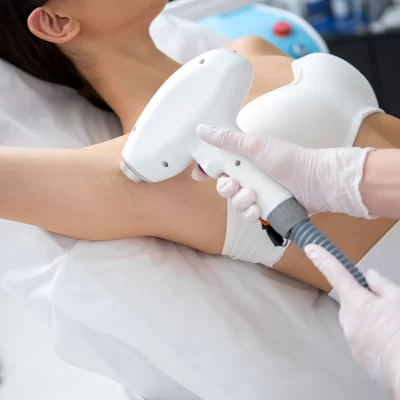Laser hair removal - how long does it last?
- How does laser hair removal work?
- Does laser hair removal permanently remove hair?
- How many laser hair removal treatments need to be done and why?
- What factors influence the durability of the effects of laser hair removal?
- What does hair regrowth look like after a series of treatments?
- When and is it worth having a touch-up procedure done?
- How to take care of the skin to prolong the effects of depilation?
How does laser hair removal work?
Depilation laser is a non-invasive treatment that allows for permanent removal of unwanted hair. Its action is based on the principle of photothermolysis. A specialist emits a focused beam of light using a diode, alexandrite, or Nd:YAG laser.
Light with precisely selected wavelength is absorbed by melanin - a pigment present in hair follicles and shafts. The absorbed thermal energy effectively destroys the hair follicle and papilla, permanently preventing further hair growth. For the treatment to be effective, the hair should be in the active growth phase called anagen.
Laser hair removal is currently the most effective and longest-lasting method of getting rid of unwanted hair. To achieve optimal results, it is necessary to undergo a series of treatments, which can remove between 90% to 95% of hair.
The laser works by precisely damaging the hair follicles, effectively preventing their future regeneration. As a result, the skin becomes incredibly smooth, and the effect can last for many years, often even a lifetime.
It is worth noting, however, that completely removing 100% of hair is practically impossible. Occasionally, individual hairs may regrow, but they are much thinner, lighter, and weaker. This is a huge advantage compared to traditional hair removal methods, which only provide short-term results and require constant repetition of treatments.
To enjoy smooth skin after laser hair removal, typically 6 to 8 sessions are needed. However, the exact number may vary.
The key factor is the hair growth cycle. The laser is effective only on hairs in the active growth phase, known as anagen. Not all hairs grow simultaneously, so a single session removes only 20-30% of the hair. Therefore, multiple sessions are necessary.
Sessions are usually scheduled every 4-8 weeks, allowing for the gradual elimination of hairs entering the active growth phase.
The effectiveness and durability of laser hair removal depend on many factors. Key is the appropriate contrast between dark hair and light skin - this is when the hair most effectively absorbs energy, ensuring optimal treatment results. Also important are the thickness, density, and overall structure of the hair.
A stable level of hormones is extremely important. Unfortunately, any disruptions, such as PCOS, thyroid problems, high levels of androgens, or hirsutism, can negatively affect the results of hair removal. In such cases, a greater number of treatments may be necessary, and sometimes even concurrent hormonal treatment to minimize hair regrowth.
Other factors that affect the longevity of laser hair removal results include:
-
genetics,
-
age - the best results are observed after the adolescent period,
-
medications being taken,
-
obesity,
-
level of stress,
-
use of anabolic steroids.
An experienced cosmetologist always considers all of these aspects to precisely tailor the treatment plan and ensure the best possible results.
After completing a full series of laser treatments, hair regrowth is minimal. Any individual hairs that may appear are usually sparse and weakened. They are unable to regenerate, even if not completely eliminated.
Immediately after the session, damaged hairs begin to fall out. This natural process typically lasts from 1 to 3 weeks.
To maintain the ideal smoothness of the skin after laser hair removal, it is recommended to undergo reminder sessions. Usually, one session is enough, which is done once a year, and sometimes even less frequently - for example, every few years. It is important to remember that new hair may grow from dormant hair follicles, often activated by hormonal changes caused by pregnancy, menopause, or stress. By undergoing reminder sessions, you will significantly prolong the smoothness of your skin, allowing you to enjoy the effects of hair removal for years.
For achieving lasting effects of laser hair removal, proper skin care after the treatment is essential. Immediately after the session, the skin may be irritated, so it is recommended to use soothing cosmetics that will help with its regeneration.
For the first 2-3 days after the treatment, it is advised to avoid hot baths, sauna, and swimming pools. Sun protection is also extremely important. For at least 4 weeks after the treatment, regularly apply a sunscreen with SPF 50 to the depilated areas. This way, you will significantly reduce the risk of complications such as discoloration or swelling.
